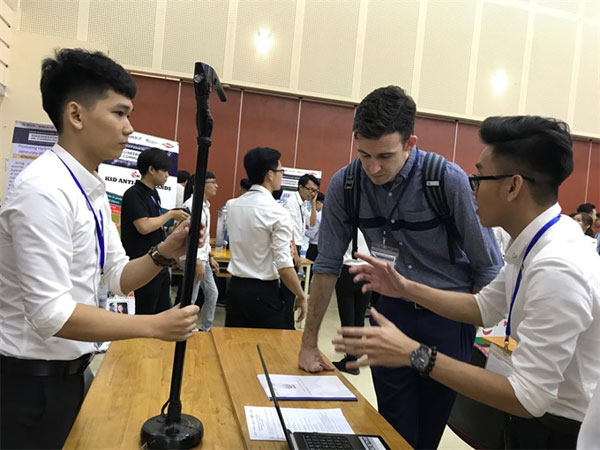
More university and high school students are participating in innovative technology and engineering activities to serve community needs.
 |
| Phan Anh Tuan, a student at the Electrical and Electronic Engineering Faculty under HCM City University of Technology and Education, and his friends won a prize for developing a smart walking cane. |
More university and high school students are participating in innovative technology and engineering activities to serve community needs.
Student Phan Anh Tuan of the Electrical and Electronic Engineering Faculty at the HCM City University of Technology and Education and his schoolmates developed a walking cane with a smart device.
“This stick has clever features like a GPS navigation device, flashlight and an alert when users fall. It sends information on their location to their relatives via text messages,” Tuan said.
Vietnam is one of the fastest ageing countries in Asia, according to Tuan. By 2050, the number of people 60 years and over will triple from 8.9 per cent to over 30 per cent or 32 million people. The number of people over 80 will also triple to over 6 per cent of the population.
According to a national survey on the elderly in Vietnam conducted in 2011, more than 56 per cent of the elderly were assessed as weak and 6.7 per cent very weak.
The main problems they face deal with joints, muscles, and bones, Tuan said.
“However, most of the walking sticks used by the elderly are very rudimentary, so we wanted to create a cane combined with smart devices,” he added.
Their initiative won a prize in a contest held by the USAID BUILD-IT & Dow Vietnam STEM Program: Engineering Projects in Community Service (EPICS).
“After the contest, we will ask our universities to commercialise the smart walking cane for the market,” Tuan said.
Do Thi Thu Hien, a student in the Mechanical Engineering Faculty at the HCM City University of Technology and Education, said the students never gave up, even though they had to try several times to develop the stick.
Tuan and Hien’s team included many students from different faculties, so they were able to learn from each other, including academic knowledge and soft skills.
“Project-basing learning is interesting. We can learn how to solve potential problems,” Tuan said.
EPICS is an international award-winning, designed-based, service-learning programme founded at Purdue University in 1995. It is recognised as the model of service learning where students not only learn by doing, but also by creating.
Working together, the United States Agency for International Development’s (USAID) Building University-Industry Learning and Development through Innovation and Technology (BUILD-IT) Alliance, implemented by Arizona State University and the Dow Vietnam STEM Programme, supports student-led innovation and service learning at Vietnamese universities.
The USAID BUILD-IT Alliance is a five-year public-private partnership founded to support world-class engineering programmes and create work-ready graduates in Vietnam.
The Alliance has over 16 industry partners and 11 Vietnamese university partners. Collaboration between the Alliance members strengthens university-industry linkages, and introduces project-based learning programmes such as Engineering Projects in Community Service into Vietnamese STEM programmes.
In other EPICS contest held last year, a team of students from HCM City University of Technology at the Vietnam National University HCM City made a long-sleeved T-shirt from wood fiber which is resistant to ultraviolet rays.
Many other innovative products were also exhibited at the contests.
Besides university students, high school students have also developed innovative ideas. Their products won prizes last year in a contest titled Community’s Ideas, which encouraged individuals and organisations to come up with innovative technology ideas, products and solutions for socio-economic development.
The contest was organised by Khám Phá (Discovery) magazine and the city’s Department of Science and Technology’s Grassroots Level Science Management Division.
Mai Quoc Huy, a ninth grader at Ban Co Secondary School in District 3, made adjustments to an electric bicycle with electronic equipment so that it became a “smart” device.
A magnetic stripe card activates the lock of the bicycle, which is charged by solar energy. Its lights are turned on by a sensor when nighttime falls, and when a driver turns left or right the indicators turn on. The bike can run up to 25km per hour.
Bui Quoc Du, a teacher at Le Thi Hong Gam Technical Education and Career Consulting Centre, said: “Many young people are very creative. They have innovative ideas. But it is not easy for them to turn the ideas into real products because they don’t have much money to buy materials for research.”
(Source: VNS)





